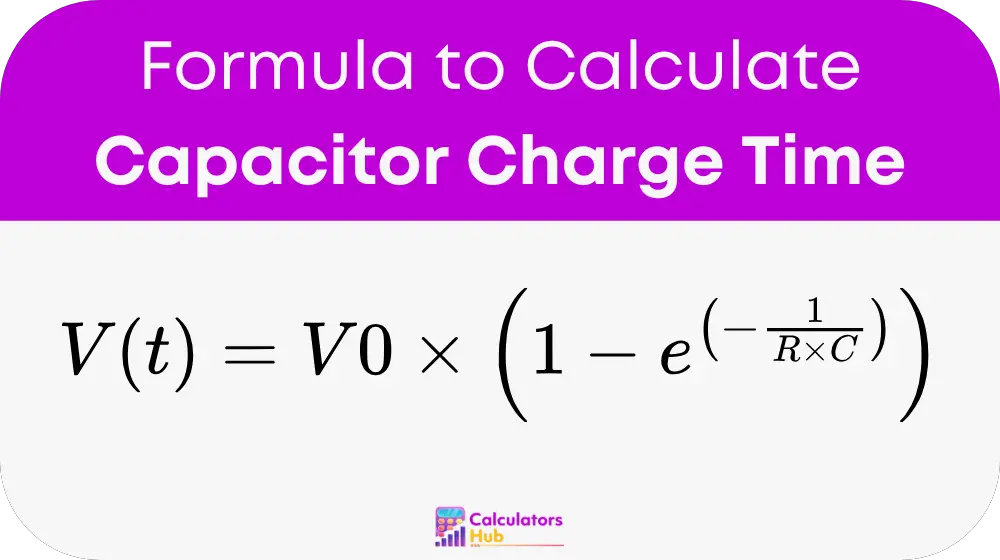0 V
A Capacitor Charge Time Calculator helps you determine how long it will take for a capacitor to reach a certain percentage of its maximum voltage when charging in an RC (resistor-capacitor) circuit. Capacitors are essential components in electronic circuits, storing and releasing energy as needed. The time it takes for a capacitor to charge is influenced by the resistance (R) and capacitance (C) in the circuit.
When voltage is applied to a capacitor through a resistor, it doesn't instantly charge. Instead, it charges gradually over time, following an exponential curve. Understanding the charge time is crucial in designing circuits where precise timing is needed, such as in filters, timers, or pulse circuits. The Capacitor Charge Time Calculator simplifies this process by calculating the charge time based on your input values for resistance, capacitance, and voltage.
Formula of Capacitor Charge Time Calculator
To calculate the charge time of a capacitor, we use the following formula:

Where:
- V(t) = Voltage across the capacitor at time t in volts
- V0 = Supply voltage in volts
- t = Time in seconds
- R = Resistance in ohms
- C = Capacitance in farads
- e = Euler’s number, approximately 2.718
This formula provides the voltage at any given time during the charging process. As time progresses, the voltage approaches the supply voltage, but it never fully reaches it. Typically, engineers consider a capacitor to be fully charged when it reaches about 99% of the supply voltage, which happens after 5 time constants (5 * R * C).
Key Considerations
- Time Constant (τ): The time constant is defined as τ = R * C. It represents the time it takes for the capacitor to charge up to about 63% of the supply voltage.
- Full Charge: After 5 time constants, the capacitor is considered fully charged. At this point, it reaches over 99% of the supply voltage.
General Capacitor Charge Times
Below is a table that provides an overview of how quickly a capacitor charges relative to the number of time constants that have passed.
| Time Constants (τ) | Voltage Across Capacitor (% of V0) | Description of Charge Status |
|---|---|---|
| 1 τ (R * C) | 63.2% | Capacitor charges rapidly at first. |
| 2 τ | 86.5% | The charging rate slows. |
| 3 τ | 95.0% | Capacitor is mostly charged. |
| 4 τ | 98.2% | Nearly full. |
| 5 τ | 99.3% | Considered fully charged. |
This table gives a rough idea of how quickly a capacitor charges in relation to its time constant. Instead of calculating this manually every time, the Capacitor Charge Time Calculator can instantly compute these values based on your specific parameters.
Example of Capacitor Charge Time Calculator
Let’s consider an example to illustrate how the capacitor charging process works.
Example:
- Supply voltage (V0) = 12V
- Resistance (R) = 10kΩ (10,000 ohms)
- Capacitance (C) = 100µF (100 x 10^-6 farads)
- First, calculate the time constant τ:τ = R * C = 10,000 Ω * 100 x 10^-6 F = 1 second
- To find the voltage after 3 seconds of charging, we plug the values into the formula:V(3) = 12V * (1 - e^(-3 / 1))Using Euler’s number e ≈ 2.718, we get:V(3) ≈ 12V * (1 - e^(-3)) ≈ 12V * (1 - 0.0498) ≈ 12V * 0.9502 ≈ 11.4VSo, after 3 seconds, the capacitor has charged to approximately 11.4 volts.
This shows how quickly the capacitor charges and how the calculator can help you determine voltage at any time during the charging process.
Most Common FAQs
A capacitor is considered fully charged after 5 time constants, or 5 * R * C. At this point, the capacitor has reached over 99% of the supply voltage.
A capacitor takes time to charge due to the resistance in the circuit. The resistor limits the current flow, causing the capacitor to charge gradually rather than instantly. This is why the charging process follows an exponential curve.
Increasing the resistance (R) or capacitance (C) increases the time constant (τ = R * C), meaning it will take longer for the capacitor to charge. Reducing either R or C will shorten the charging time.